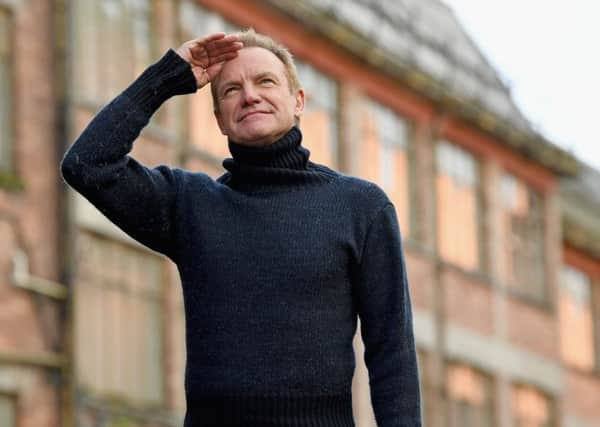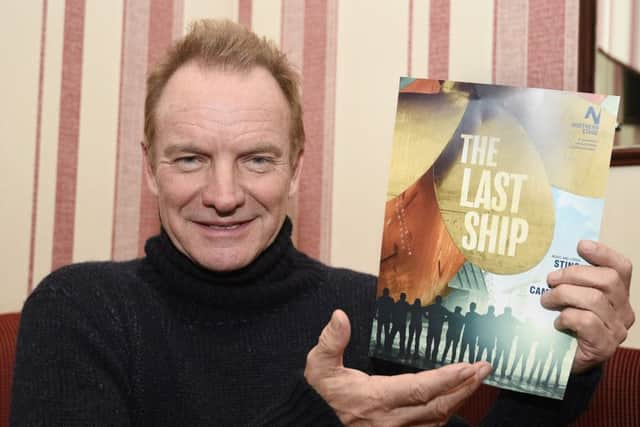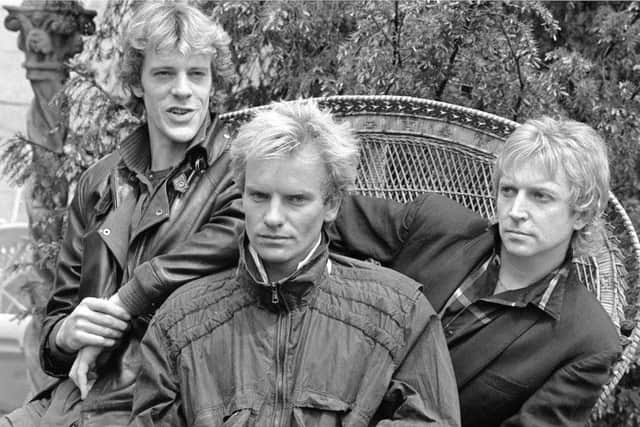Interview: Sting on bringing his debut musical to Scotland


It’s a cold winter’s day and Sting slides out of a minivan with blacked-out windows, wearing yoga trousers and a navy fisherman’s jumper. He pads quickly across the cobbles into Leith Dockers Club past a line of fans queuing to watch him perform a mini preview of songs from his debut musical, The Last Ship. It’s an incongruous setting for the multi-millionaire musician universally known by his sole moniker, a small social club in the heart of Leith, yet it’s entirely appropriate for a show inspired by the closure of the shipyard in Wallsend, Sting’s home town. With the last ship built in the Leith yards rolling down the slipway in 1983/4 and Swan Hunter closing its gates in Wallsend a decade later, both places are inextricably linked with shipbuilding and the effects of its decline.
Sting grew up on one of the terraced streets in the shadow of the shipyards, in the heart of a community that for more than a century produced the skilled workers that built the liners, tankers and warships whose mountainous hulls dominated the skyline. He watched each morning as the houses emptied at the summons of a whistle and the workers marched into the yards, and at night saw the flashes of blue sparks from welding torches light up the sky. He felt the pride when the ships rolled down the slipway at a launch and the anger when the yards closed for good. Yet Sting didn’t join the river of humanity streaming into the yards, he escaped to become a musician instead and now he uses his skills to tell the story of his community’s struggle in The Last Ship, the tale of a runaway welder’s son who returns after 17 years at sea to find the girl he left behind and the shipyards fighting closure.
Advertisement
Hide Ad“I grew up in this very surreal industrial environment. It’s all knocked down now,” says Sting. “I remember all the ships – these things would blot out the sun. It’s a very powerful symbol for me, a ship.


“The Last Ship is about the dignity that work gives you, which is a universal theme. It’s also about where I come from, where I was born, raised and educated, and where the people have been thrown on the scrapheap. You can’t have economy without community and I wanted to give a voice to my town.”
Originally a play, The Last Ship evolved into a musical that tells the story of the last ship to be built in the yard, interwoven with the tales of the characters involved; the union boss, the shipyard workers, the musician who escaped, his girl. Sadly Jock the Singing Welder, inspired by Billy Connolly who told Sting all welders are crazy because of the fumes and helmets that convince them they can sing like Elvis, had to be dropped from a crowded score.
“But I’ve a mind to get up on stage and sing that one night in a mask.”
Already winning rave reviews for its ensemble cast including Joe McGann and Richard Fleeshman, the UK tour comes to Scotland in June, following a one-off outdoor show in Newcastle Quayside on Monday.


After a 2014 Tony Award incarnation on Broadway, it’s been revised for a British audience with the love story dialled down and the politics ramped up.
Advertisement
Hide Ad“The government wants to close the shipyard so they occupy it and finish the ship,” says Sting. “It’s a grand gesture, inspired by what happened on Clydeside in the 1970s. It’s saying ‘this is what we are, who we are proud to be and you can’t throw us on the scrapheap.’”
It’s a sombre subject, yet the mood today is upbeat. There’s an air of “what the ?, Sting’s on the stage at Leith Dockers on a Monday afternoon” excitement, as he steps up on to the small stage in the function room, next to a keyboard player and drummer, and picks up a guitar. It’s an intimate setting, with a semicircle of seats on the dance floor and a buffet laid out on tables along one wall, and framed notices warning members and guests against indulging in “after hours drinking or singalongs” back in the hallway.
Advertisement
Hide Ad“It’s years since I’ve been in a social club,” says Sting to his audience. “What time’s the bingo?”


“You can do the calling, Sting,” shouts someone.
Everyone laughs. It’s a home crowd. He kicks off with an explanation of the conflicted emotions the yards stirred in his younger self.
“I thought is that my future, to work in the shipyard? That’s the last place I wanted to be. It was noisy, dangerous and had one of the worst health and safety records in Western Europe. I had other dreams – that I would be a writer and musician and sing all over the world, make extravagant amounts of money and be famous.” He pauses. “And that happened,” he laughs. “But I never forgot where I was from.”
Around seven years ago Sting started to write the songs influenced by people he knew and the folk music culture of Tyneside, and inspired by two events: firstly the shipyard workers of Gdansk, who when their yard closed built a bread kitchen, and secondly by the occupation and work-in staged by the Upper Clyde Shipbuilders (UCS) in Govan in 1971-2, under the leadership of Jimmy Reid.
“They decided not to strike, but kept making ships, and it went on for a year,” says Sting. “It’s a hugely inspirational story and Jimmy Reid was a hero of mine. But it’s not all drama and politics,” he says, “there are happy moments, joyful moments, and there’s a love story too. It’s not all biographical, but there are elements that have seeped in.”
There’s a difficult father/son relationship that has echoes of Sting’s own, for instance. “My relationship with my father was tense,” he says. “He wanted me to learn something technical but I passed the 11 plus and got into grammar school. He never understood why I wanted to learn Latin – he was right! He inspired the song Dead Man’s Boots,” says Sting, and proceeds to sing the song where a shipworker wants to pass his work boots on to a son who has other ideas. Half way through he falters, then recovers, to explain at the end: “My old man’s been dead for 25 years but he just paid me a visit. That’s why I lost my way.”
Advertisement
Hide AdHe moves on to Gideon’s Song (“Gideon leaves town, and I went to sea for a while as a musician on a cruise ship – playing the Top 40, old time dancing, I hated it. Hated it! Jumped ship in Izmir, hitched home”), then runs through others from the score, a stirring When The Last Ship Sailed and a poignant What Say you Meg?
“Steven Spielberg saw it in New York and said it would make a great film,” he tells us. “I said, really, do you know anyone?” He laughs. “I’m going to invite him to come to one of the UK shows and you never know.”
Advertisement
Hide AdNever mind Spielberg, the Dockers crowd love the songs and when it’s over Sting chats, poses for selfies and signs someone’s bass guitar, then it’s through to a back room for interviews.
Born Gordon Sumner in Wallsend in October 1951, the eldest of four children of Audrey, a hairdresser, and Ernest, an engineer then milkman, Sting knew from an early age he wanted to escape the yards.
As well as tension over his future, with his father who worked as an engineer in a factory building turbines before Sting’s mum persuaded him to become a milkman, Sting’s career choice received an unlikely intervention in the form of The Queen Mother. When the eight-year-old witnessed her driving past in a fancy car on her way to launch a ship, he decided he’d like to be rich and famous too.
“Absolutely, that’s God’s gospel truth, I did.”
With a mother who played the piano – “She loved Rodgers and Hammerstein” – and a guitar inherited from an uncle who emigrated to Canada, music was the portal to that bigger world.
“It only had three strings but I recognised that guitar as a friend for life and started writing songs. Then the Beatles turned up, from a Northern industrial city, writing their own songs, they conquered the world, gave us permission. Music was my route out, after education.”
Sting worked as a teacher after school, all the time playing music in clubs, before packing up with his then wife the actor Frances Tomelty and child, and driving to London, “with only a floor to sleep on in Battersea and one telephone number, Stewart Copeland’s”. The pair had met when Copeland played Newcastle, and so in 1977 The Police were born with Sting as lead vocalist, bass guitarist and main songwriter, Andy Summers on guitar and Stewart Copeland on drums. With their new wave, reggae-influenced sound, for ten years they topped the charts with hits including Roxanne, Message in a Bottle, Don’t Stand So Close to Me and Can’t Stand Losing You and five consecutive UK No 1 albums, amassing sales of more than 75 million records. So with the 40th anniversary of their first hit this year, does Sting have anything planned to celebrate?
Advertisement
Hide Ad“No. I’m not nostalgic in that sense. I mean, I’m very proud of The Police, what we achieved, that was wonderful, and I have nothing but gratitude about it... but I don’t want to relive it.”
After The Police Sting’s solo career racked up 13 albums, most recently 57th & 9th in 2016. There were Grammys, Golden Globes, and a CBE, and acting roles, from Quadrophenia, to Lock, Stock and Two Smoking Barrels. Musically there have been collaborations with Paul Simon, Peter Gabriel, Nicole Scherzinger, Mary J Blige and Anoushka Shankar, to name a few. Most recent is Shaggy, the pair releasing the album, 44/876 (44 representing the British dialling code and Sting, 876 the Jamaican one and Shaggy) this year, celebrating their mutual love of reggae and Jamaica, and after a European tour, they tour the US in the autumn. They played the Queen’s birthday party at the Royal Albert Hall this year, and Sting also performed at a gig to re-open The Bataclan, a year after the terror attacks that killed 90 in the venue he had played with The Police.
Advertisement
Hide AdWith his money and fame, multiple houses, transatlantic lifestyle and apocryphal marathon tantric sex sessions (he was joking), he’s an easy target for accusations of woo-woo behaviour, yet sitting opposite me at a round pub table, as the afternoon clientele catch up on the horse-racing over a pint, he’s completely at home in the convivial club ambience and enjoying himself.
“Yeah, I haven’t been in one of these clubs in 40 years. I used to play them every weekend in Sunderland and Newcastle. It’s a very good apprenticeship because they will throw crap at you. We broke the bingo machine in one once, totally by accident, and when they wheeled it out the balls went all over, so we ran. Never invited back,” he says and smiles.
His transatlantic accent, en route between New York and the North East, comes to land firmly in Wallsend as he talks about his upbringing, the shipyards and his relationship with his dad. These days he lives mainly in New York, but he also has homes in the UK and Italy. “I’m one of Theresa May’s citizens of nowhere,” he says dryly, referencing her post-Brexit speech targeting those with global allegiances. Yet for all his championing of global issues, Sting is still firmly rooted in the community that formed him.
“I think you’re formed in the first seven years of life. Pride of community, pride in the dignity of work, identity, came from that. You know I’m a proud Geordie, though I don’t sound it most of the time, unless I get angry – my kids know I’m serious when I start speaking in a funny voice as they call it.”
So in the function room, what did he mean he saw his dad? Was it a ghost?
“No, but he was with me. He came and saw me there, and I lost it, lost the words. It’s nice to see him occasionally. He sometimes comes to me in dreams.”
Advertisement
Hide AdWhat does he say? That he’s proud, that Sting was right to follow his dreams?
“Yes. He’s very proud of me, my dad. I don’t think our relationship was any better or worse than anybody else’s in my street. It was a generation who found it hard to say they loved you, inured to that kind of emotion. But my mother was a completely different kettle of fish, very emotional, very warm. And it was that conflict with my dad that was the engine that drove my ambition. I’ve understood him more now I’ve outlived him.”
Advertisement
Hide AdAt this point I ask him to sign some singles I’ve brought along, bought when The Police topped the charts.
“Whose are these?” he says. Maybe he thinks they’re eBay bound.
“Mine.”
“They’re yours?” He sounds surprised and picks them up. “I don’t have any of these,” he says, looking at the picture cover of Can’t Stand Losing You, “That’s Stewart,” he says of the figure apparently hanging himself. “Ha!” he smiles at the memory of the photoshoot.
“Would you like them?” I say, hoping he’ll say no – well, they’re picture sleeve, coloured vinyl and cost a week’s pocket money – but he did make them, so it seems only fair.
“No. I don’t keep things like that,” he says. Sting’s not bothered about stuff apparently, as befits someone with such a public social conscience. He’s always been political – from Amnesty International to Band Aid to setting up the Rainforest Foundation Fund with his wife Trudie Styler to campaign on protecting rainforests and their indigenous peoples. Does he think he’s getting any more political as he gets older?
“I’m a 66-year-old man, and a grandfather, with a duty to try and make the world as safe as I can possibly make it for my offspring and community, if that’s political. And I’m pretty disheartened by what’s going on in Britain at the moment, certainly by what’s going on in America. It’s frightening, so we really have to take a position and act accordingly.” He pauses, then adopts the argot of his youth, the vernacular of the shipyard community where his political consciousness was forged: “You have to man the picket lines.”
Advertisement
Hide AdWhen he’s not manning metaphorical picket lines and using music to make a point, he’s hanging out with Styler, the actor and film producer who produced and co-directed Guy Ritchie’s Lock, Stock, and Two Smoking Barrels, Duncan Jones’ Moon and the adaptation of Irvine Welsh’s Filth, making her directorial debut with Freak Show in 2017.
“Yeah, we’re empty nesters now. The kids have gone – I have six, and six grandchildren – it’s great! I miss them, but it’s also wonderful. We have two actors, two musicians, a filmmaker and the youngest is still at college, deciding. They’re amazing.”
Advertisement
Hide AdSting sounds content, loving his life with Styler so I ask him if he’d describe himself as a romantic. He smiles at the question.
“Am I a romantic? Yes, I’m a romantic. I’ve been married for 35 years to a wonderful woman – she’s not sick of me yet. Well, I spend a lot of time away on tour.” He laughs, then bluff gives way to sincere. “We love each other. But more importantly than that, we like each other. We have similar backgrounds, she’s working class from the Midlands and we have similar nostalgias, the same TV shows as kids, we can sing the same advertising jingles... she makes me laugh.”
With the European and US tours of his new album and another solo album in the making, after The Last Ship tour, Sting isn’t slowing down. Well, he’s got six kids and six grandchildren to support, although he’s said they won’t be inheriting much of his estimated £180 million, earning their own living.
“I did promise them all I’d pay for their education, and maybe the floodgates are open,” he laughs. “But I’ll keep working because I love my job. As long as I can still do it – it’s the job of a 20-year-old really – but I’m well trained, I swim every day, do a bit of yoga, and the actual performance is athletic, so I don’t put weight on. I have an appetite for work.
“I’d love to write another musical play but I can’t imagine anything that would have such a passion for me as this story. This was an important narrative to tell. Without the narratives, there’s no sense in the world and we all need our stories to be told.
“It’s been the hardest thing I’ve ever done,” he says. “It’s like building a ship from the ground up and then you have to steer it in the right direction, support the crew ... er cast,” he says, and sits back and laughs at the slip, content and proud to be celebrating the launching of The Last Ship in Leith.
The Last Ship will be at Festival Theatre Edinburgh 11-16 June (www.capitaltheatres.com) and Theatre Royal Glasgow 18-23 June (www.glasgowtheatreroyal.org.uk), www.thelastshipmusical.co.uk